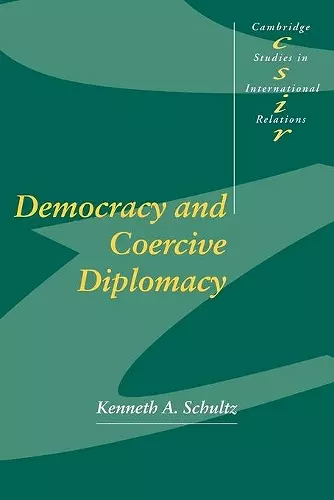Democracy and Coercive Diplomacy
Format:Paperback
Publisher:Cambridge University Press
Published:26th Jul '01
Currently unavailable, and unfortunately no date known when it will be back

This book, first published in 2001, argues that political competition between government and opposition parties influences threats in international crises.
In this book, first published in 2001, Kenneth Schultz explores the effects of democratic politics on the use and success of coercive diplomacy. He argues that open political competition between the government and opposition parties influences the decision to use threats in international crises, how rival states interpret those threats, and whether or not crises can be settled short of war. The relative transparency of their political processes means that, while democratic governments cannot easily conceal domestic constraints against using force, they can also credibly demonstrate resolve when their threats enjoy strong domestic support. As a result, compared to their non-democratic counterparts, democracies are more selective about making threats, but those they do make are more likely to be successful - that is, to gain a favorable outcome without resort to war. Schultz develops his argument through a series of game-theoretic models and tests the resulting hypothesis using both statistical analyses and historical case studies.
'It is always a pleasure to read a book with such a broad scope and possible important consequences not only for political theory, but also practice as the one written so intelligently by Kenneth Schultz. … It will … be very useful for anyone working and dealing with international security issues; and perhaps, it would provoke others to further and elaborate the issues stirred up by Schultz's research.' Emilian Kavalski, Global Review of Ethnopolitics
ISBN: 9780521796699
Dimensions: 229mm x 152mm x 18mm
Weight: 480g
324 pages